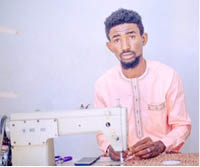Despite the economic challenges facing Nigeria, tailors are making brisk business sewing clothes for the upcoming Eid al-fitr celebration, Daily Trust Saturday reports.
Tailoring shops in Kano metropolis are rife with activities as people, determined to get new clothes for the upcoming festivities, throng them.
Eid al-fitr, which marks the end of Ramadan, is a time for Muslims to gather in prayer, share meals and exchange gifts. It’s also a joyous occasion celebrated with new clothes, especially for the kids. However, with soaring inflation and the cost of everyday goods significantly increasing, this year’s celebration is tinged with concern due to the ongoing economic hardship.
Traditionally, during Ramadan and especially towards the end of fasting, people take their fabrics to tailors in anticipation of wearing new clothes for the Eid al-Fitr celebration.
- How local barbers, tailors ‘survive’ amid extinction threat
- Electricity tariff hike: Tinubu’s reforms lack human face – Atiku
Daily Trust Saturday interviewed different tailors to know how patronage has been this year compared to previous years.
Abba Umar Muhammad, a tailor who operates in Koki Quarters of Kano State, said his hope for this year is as strong as last year’s.
He initially thought patronage would be low, but looking at the number of clothes he’s working on, he rates this year as good too.
“I’ve stopped taking new orders because I have a lot to work on, especially in the last three days.
“I thought it wouldn’t get up to this amount because everything is expensive in the market and people don’t have money. But look at clothes piled up just like previous years,” he said.
Similarly, Idris Adamu, a tailor with years of experience in Hadejia Local Government Area of Jigawa State, says even though people are careful with their spending, “Eid is Eid,” and people still want to look their best.
He said he has sewn enough clothes and doesn’t think he can finish all of them before Eid. He said he will still try to strategize and make sure everyone gets at least one outfit for the day.
“Some people brought over five sets, some six, while some brought just two or three, so you can see, not everybody will get their clothes before Eid,” he stated.
However, Rabi’u Sulaiman, a professional unisex tailor, said there’s low turnover compared to previous years.
“People want to wear new clothes, but food is expensive now. We thought with the payment of this month’s salary, people would bring more clothes, but there’s still low turnout, especially from civil servants.”
Speaking about Sallah preparations, Musa Ibrahim Umar, a middle-class business owner in Hadejia, said “We might have to cut down on other things, but new clothes for Sallah are important. It’s a way to celebrate and show gratitude.”
He said, “I started my preparations almost two months before Ramadan because I know Sallah clothes are important.
“Even though the fabrics are expensive now, we have to do it no matter what. I’ve already made clothes for myself, my wife, and my little daughter, though I spent a lot.”
However, a resident of Koki Quarters, Salisu, told our reporter that he hasn’t sewn any Sallah clothes yet because it doesn’t matter to him.
“I can’t say I don’t have the money to buy clothes, but I don’t have time for that,” he said. “I spend most of my time in the market looking for money to feed my family.”
“I don’t bother myself because I’ve already confirmed with my tailor who works in Dorayi area of Kano State, that I can still get it before the time,” Salisu continued. “He’s been my friend and has never disappointed me. So, I will still get it before then.”

 Join Daily Trust WhatsApp Community For Quick Access To News and Happenings Around You.
Join Daily Trust WhatsApp Community For Quick Access To News and Happenings Around You.


